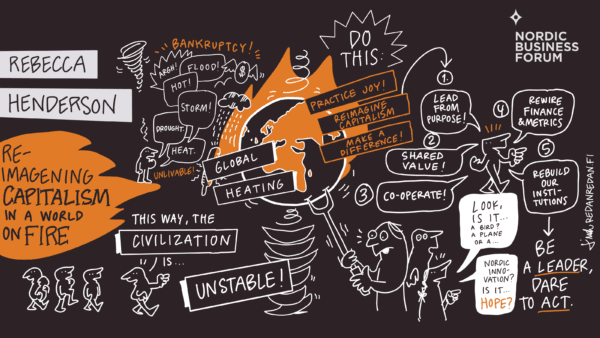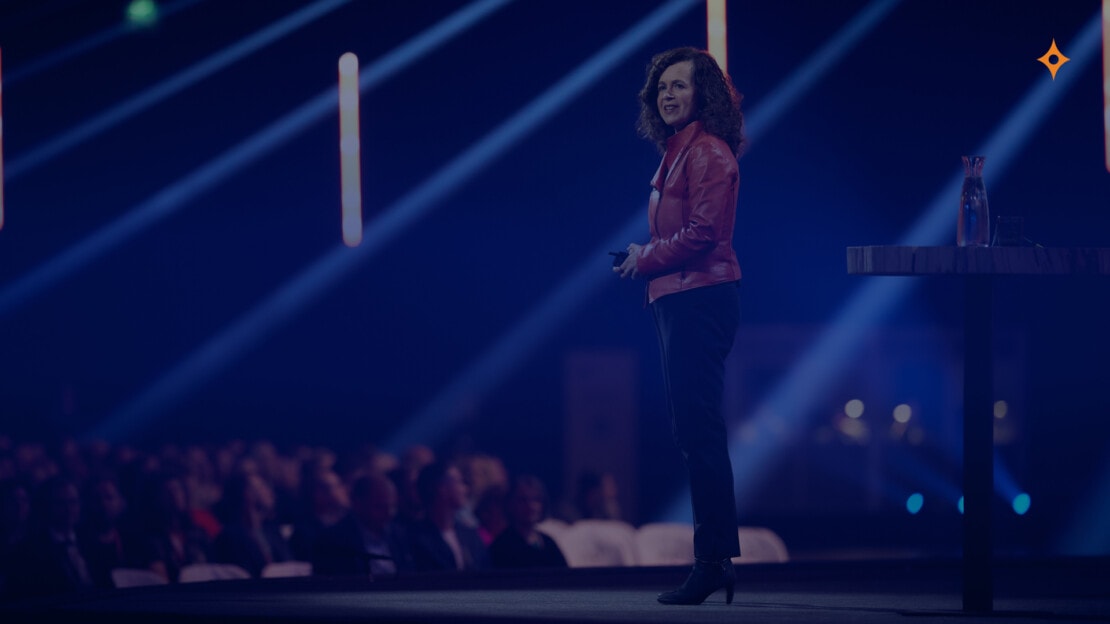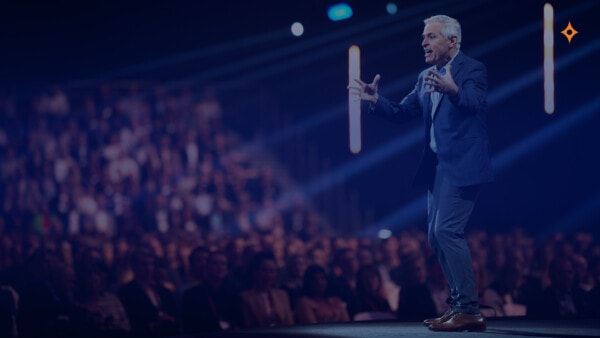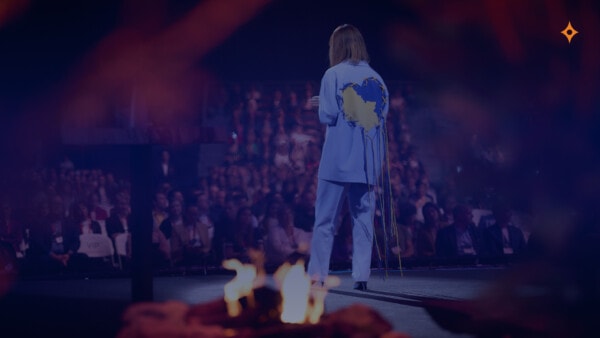3Oct2023
Rebecca Henderson, professor at Harvard University, renowned economist, and academic researcher, challenged the audience with a difficult-to-solve question: How can we save capitalism from itself? “I think capitalism is one of the great inventions of the human race, an unparalleled source of innovation, prosperity, and change. But I am nervous. We live in a world on the edge,” she said. Some examples of the
complex and pressing threats are the war in Europe, the high levels of inequality, and the climate emergency, among others. In order to explain how to generate hope and channel the force of business towards tackling these problems, Rebecca focused on the climate change issue.
Climate weirding or global heating
To put global heating into perspective, Rebecca briefly described the history of civilization. The first human Homo Sapiens emerged 200,000 years ago, and the first settlements date back to 10,000 years, but modern civilization in the sense of debt markets, government securities, and limited liability companies are only a few hundred years old. “The reason humans didn’t settle before 9,500 BCE was because the climate was too unstable to allow anyone to stay in one place,” she explained.
Stable climate made it possible to build settled communities, and with them rose governments, cultures, infrastructure, industry, and finance markets. Civilization was built on predictability. Schools, for example, have vacations in the summer, and city storm sewers are designed for an expected amount of rainfall. But as the climate gets warmer and more unstable, the foundations of civilization are shattered, and the future looks grim. One-in-100-year storms are now more frequent and droughts more severe and long-lasting. In fact, Rebecca shared several maps that depicted the regions that would become unlivable if temperatures continue to rise, and predicted catastrophic consequences for the whole planet.
As her description reached its climax, she asked the audience how this outlook made them feel and then changed gears to an upbeat mood. “We need to face what’s going on, hold the grief and then choose hope.”
Up next, she gave some reasons to be hopeful. Rebecca remembered that 20 years ago nobody believed clean energy could be cheaper than coal, but this is happening now. At the same time, the solar installed capacity of renewables is booming. And some models suggest that in the last five years we have cut our expected warming for this century almost in half. While she admitted that we need government regulation, she highlighted the important role that Nordic Business Forum attendees play in moving the economy in the right direction. “You are in Scandinavia, one of the richest, best educated, most innovative regions in the world. You have choices and you can make an enormous difference. You could be catalytic in showing the rest of the world what some of these technologies look like.”
Roadmap to reimagining capitalism
In order to perform such a catalytic role, Rebecca gave the audience two pieces of advice. First, to practice joy. This can take many forms: for example, dedicating 10 to 15 minutes every day to connect with your deepest self and appreciate where you are, walking in nature, dancing, singing, or doing something that takes you away from the frenzy of daily activities.
Once you practice joy, you can move on to the second piece of advice and follow the roadmap for reimagining capitalism:
1. Reimagine the purpose of the firm and lead from purpose. According to Rebecca, a company’s purpose is to build a thriving and prosperous community. While she admitted that making money and keeping shareholders happy are necessary, she considered them a means to an end. “We all need to breathe but the purpose of life is not breathing, the purpose of life is to make a difference.” To support this argument even further, Rebecca argued that there is plenty of evidence that suggests that having an authentic purpose has a huge impact on productivity and creativity and can significantly increase performance. “You can be purpose-driven and make money,” she pointed out.
2 . Create shared value. Rebecca illustrated this idea with the diagram of two circles, the “making money circle” and the “public problems circle”, with “shared value” lying at the intersection. Although she admitted that public problems can be addressed by creating good jobs or selling decent products, she gave examples of companies that are going one step further, like Iberdrola, the Spanish firm that decided to invest in renewable energies as a hedge against the energy transition. Other examples are the Korean firm SK, a chemicals conglomerate whose CEO decided to massively invest in electric batteries, and Walmart, the global retailer that re-engineered the fuel efficiency of its trucking fleet and reduced their fossil fuel usage by 23% in the last five years.
3. Learn to cooperate. Some problems can’t be tackled individually. An example drawn from the textile industry is the partnership between consumer goods companies to stop deforestation in Brazil, Indonesia, and Malaysia. “They haven’t succeeded completely but they made an enormous difference saying to the suppliers we will not buy from you unless you stop deforesting.” Another example is Mission Possible, a group that is working to find new ways of producing steel and cement with less fossil fuels jointly funded by leading firms in those industries.
4. Rewire finance and accounting. Rebecca summed up this idea in one slide that stated: what gets measured gets managed. She underlined the need to keep working to get better metrics that can measure a company’s environmental, social and governance impact. And she had a special piece of advice to individual firms: “pick measures that are material, auditable and replicable, that really communicate about your business and the difference you are making.”
Tomorrow morning’s resolution
In closing, Rebecca reflected on the difficulties of change and listed major firms that failed to move through transitions. Most of them downplayed the probability of new scenarios or found themselves too busy to do something different. Based on her experience with these companies, she strongly advised the audience to choose one thing that would move them and their organization closer to acting from purpose. “Do it today or tomorrow and certainly before the end of the week,” she urged and, in the meantime, “choose hope, embrace joy, and dare to act.”

Visual summary of Rebecca Henderson’s keynote by Linda Saukko-Rauta
Want to get the full summary of the Nordic Business Forum 2023 speeches + extra content for reflecting on your learning? Download your free copy of the full Executive Summary and summaries from previous events!


